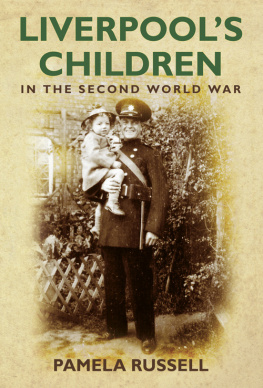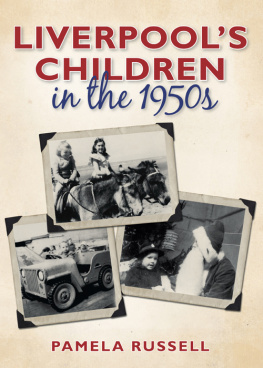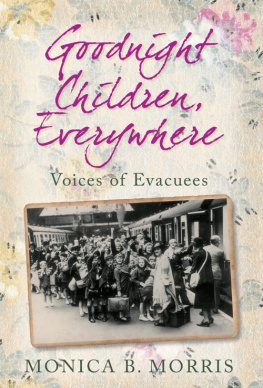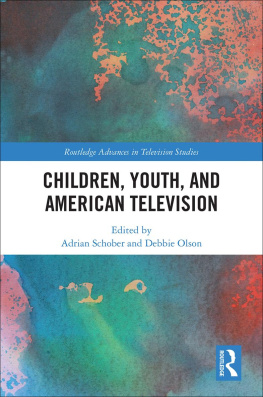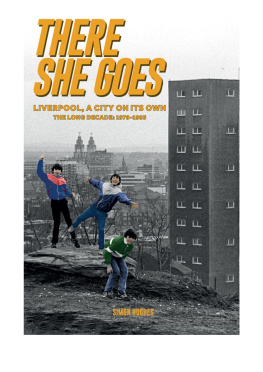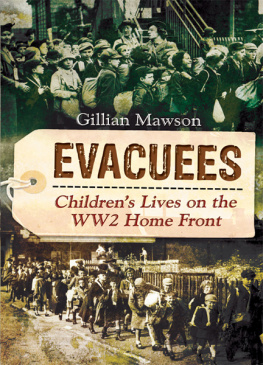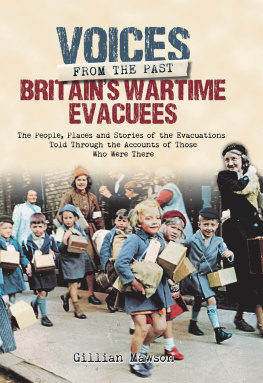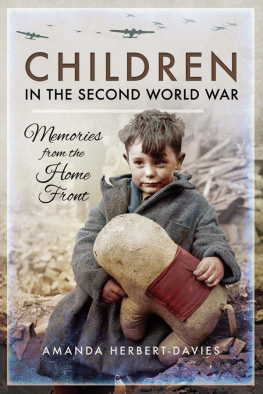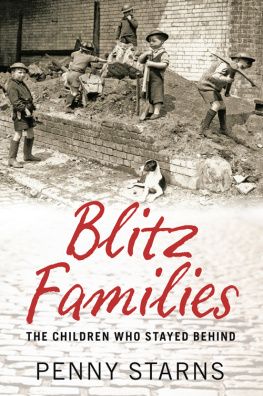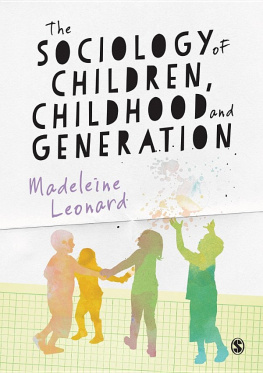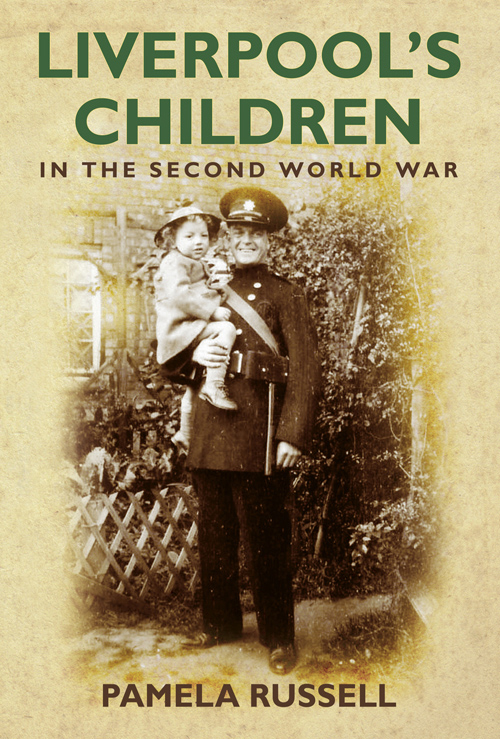LIVERPOOLS
CHILDREN
IN THE SECOND WORLD WAR
LIVERPOOLS
CHILDREN
IN THE SECOND WORLD WAR
PAMELA RUSSELL

This book is for my husband, David, my son, Christopher, and my daughter-in law, Sarah, all of whom are post-war Liverpool children. Also for my brother-in-law, Harold Russell, and my cousin, Brenda Bryce, ne Wright, both of whom were Liverpool children in the Second World War
Pamela Russell (M.Phil.) is a retired Senior Lecturer of Edge Hill University, Ormskirk, Lancashire. She has lived in Maghull, Walton and, for over thirty years, Lydiate.
First published 2009
The History Press
The Mill, Brimscombe Port
Stroud, Gloucestershire, GL 5 2 QG
www.thehistorypress.co.uk
This ebook edition first published in 2012
All rights reserved
Pamela Russell, 2011, 2012
The right of Pamela Russell to be identified as the Author of this work has been asserted in accordance with the Copyrights, Designs and Patents Act 1988.
This ebook is copyright material and must not be copied, reproduced, transferred, distributed, leased, licensed or publicly performed or used in any way except as specifically permitted in writing by the publishers, as allowed under the terms and conditions under which it was purchased or as strictly permitted by applicable copyright law. Any unauthorised distribution or use of this text may be a direct infringement of the authors and publishers rights, and those responsible may be liable in law accordingly.
EPUB ISBN 978 0 7524 8018 3
MOBI ISBN 978 0 7524 8017 6
Original typesetting by The History Press
Contents
Acknowledgements
My thanks to all the people who wrote to me with their stories of their wartime childhood, or lent photographs. James Abram, on behalf of Winifred Abram;Victoria Bradford, on behalf of Joan Stables; Linda Leaworthy, on behalf of Stan Lewis and Renee Rose; Mrs J.M. Taylor, on behalf of Phil Taylor.
Mr W Backshall
Mrs M.E. Barber
Mrs E. Barooah
Mrs M. Bentley
Mr A. Bentley
Mr F. Berwick
Mrs P. Blamire
Mr B.F. Browne
Mr R. Brundrit
Mrs B. Bryce
Mr D. Buckley
Mrs P. Burns
Mrs J. Campbell
Mrs A. Chapman
Mrs E. Charles
Mrs I. Collinson
Mr W. Courtliffe
Mr R.A. Cox
Mrs M. Crimmins
Mr G. Crompton
Mr H. Croston
Mrs D. Dalrymple
Mrs E. Davies
Mr D.E. Davies
Mrs E. Doyle
Mrs P. Fawcett
Mr D. Ferguson
Mr D. Finney
Mr A.E. Forster
Mr H. Gaskell
Mrs J. Gillett
Mr A.P. Graham
Mr A. Gahan
Mr T. Grayson
Mrs J. Greenhalgh
Mrs M. Greenwood
Mr J. Greer
Mr G. Halligan
Mrs M. Hardman
Mrs A. Harrison
Mrs B. Harrison
Mr D. Hartley-Backhouse
Mr B. Hefferan
Mr B. Hill
Mrs M. Hoban
Mr F. Holcroft
Mrs D.M. Hudson
Mr D. Hunter
Mrs J. Ireland
Mrs F. Jennings
Mr J. Johnson
Mrs E.A. Johnston
Mrs J. Jones
Mrs K. Kenyon
Mrs S. Landrum
Mrs P. Lawrenson
Mr A. Lewis
Mrs M. Luke
Mrs P. Martin
Mrs R. McArt
Mrs T. McAsey
Mr P. McGuinness
Mrs J. MacLeod
Miss J. McMurtry
Mr J. McMurtry
Mr J. Middleton
Mr R. Molyneux
Mrs S. Moonan
Mrs J. Morley
Mr F. Nelson
Mr A. Parks
Mrs S. Part
Mrs B. Patten
Mr B. Pearson
Mr R.J. Pedersen
Mrs D. Pemberton
Mrs B. Redfern
Mrs P. Rider
Mr R. Rigby
Mr B. Riley
Mr S. Roberts
Mr P. Robinson
Mr D. Rusling
Mr H. Russell
Miss M Ryman
Mrs M. Salthouse
Mrs D. Scott
Mrs O. Serridge
Mrs P. Sharkey
Mrs M. Sheehan
Ms P.A. Silcock
Mrs G. Skinner
Mr V. Smith
Miss L.G. Smith
Mr F. Smith
Miss I. Stephenson
Mrs E. Sweeney
Mrs J. Taylor
Mrs J. Tisdale
Mr P.D. Walker
Mr B. Webb
Mr T.E. Wells
Mr L. Whittaker
Mr A. Williams
Mr J.Williams
Mr M. Wilson
Mr T. Wood
Mrs O.L. Woods
Mrs M. Wrench
Mrs P. Whittington Richardson
Mrs B.Yorke
Photographs and Illustrations
Thanks to my husband, David Russell, without whose technical and photographic expertise none of these photographs and illustrations would have appeared at all.
Photographs and illustrations appear courtesy of: Vic Smith, Pam Fawcett and Gillian Skinner; Christopher Russell; Diane Courtney of UK Good Housekeeping and the National Magazine Company; Anne Gleave and National Museums Liverpool (Merseyside Maritime Museum); The Stewart Bale Collection; Mark Sargent and the Local History Unit, South Sefton, Sefton Library Service and The Imperial War Museum.
Introduction
This is the story of Liverpools children during the Second World War. It is a real attempt to tell the full story and to include as many peoples memories as possible, told in their own words. Included are numerous aspects of life in wartime, as they affected children at the time. Many of the people who have contacted me have never told the story of their experience before. Most of them make light of the less happy aspects of those times, even when they are recounting quite sad or frightening events. Almost all the stories told or sent to me include some humorous or light-hearted anecdotes, which have been included to illustrate that most children will usually rise above the worst of times. Liverpools children in the war years did not lose the sense of humour for which the city is justifiably famous. It is clear that the desire not to whine which was adopted by many of the children has become a lifelong habit for many of the wars younger generation.
At the same time, there has been an eagerness and an enthusiasm about the opportunity to tell their stories. Sometimes there was surprise that anyone is interested, suggesting that a great deal has been bottled up for too long and for a whole host of reasons personal pride, patriotism, consideration for others and, perhaps, the simple desire to forget such a confusing and complex part of childhood.
Marguerite Patten OBE, in her commentary on some aspects of the war experience for Channel 4s The 1940s House, points out that many people did not want to talk about the difficulties and fears of those years in their immediate aftermath. They just wanted to forget. By the time they were ready to talk, there was, for most people, no one to tell. This was particularly true for children. The general view then was that children should not be allowed to dwell on things they should be kept busy and would soon forget. But they did not forget.
In fact, the memories of those years are sharp and fresh and surprisingly detailed. This book began with the younger people who are interested in the experiences of the children of the war years in mind, but as it progressed, it became increasingly apparent that the re-telling of those times was a good experience for many of the narrators as well as for their audience.
The personal stories that appear throughout this book were responses to my request in the press for the wartime memories of people who were children in Liverpool during Second World War. Childhood has been defined for this purpose as under the age of eighteen in September 1939, and born before September 1945. In the grammar schools, sixth-formers could be eighteen years old and evacuated with their schools to the reception areas.

